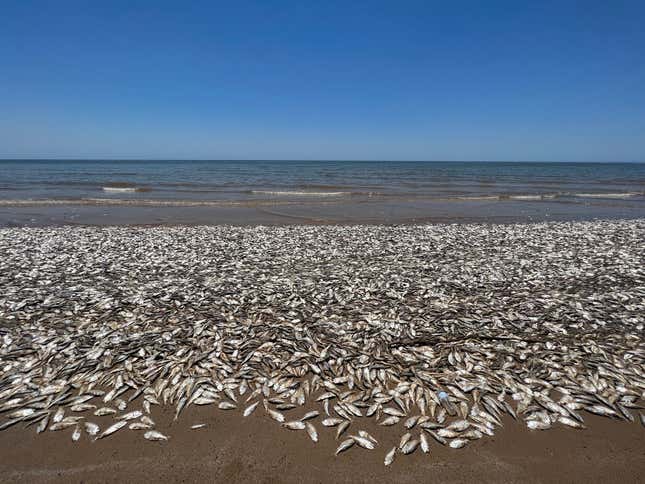High Temperatures and Low Oxygen Choke Out Thousands of Fish in the Gulf
Thousands of fish littered the shores of Quintana Beach and Bryan Beach in Texas this past weekend after low oxygen in the water killed off fish in the region, ABC13 News reported.
The die-off began on Friday and continued until Sunday. According to officials from the Texas Parks and Wildlife Department, the low oxygen affected an area large enough to have depleted water quality for thousands of marine animals in that part of the Gulf. “If there isn’t enough oxygen in the water, fish can’t ‘breathe.’ Low dissolved oxygen can be the result of human activities, but in many cases, it’s a natural occurrence,” an announcement on the department’s website said.
A Facebook post from the Quintana Beach County Park explained that the local waters lacked oxygen likely due to hot weather in the area this past week. “Fish kills like this are common in the summer when temperatures increase,” the post said. On Friday, a local National Weather Service station reported a high of 92 degrees Fahrenheit (33 degrees Celsius) in Brazoria County. Many of the fish that were affected were also in shallower waters, which warm quicker and therefore lose oxygen faster than deeper waters.
As of Sunday afternoon, the beach was mostly cleared of dead fish, according to the notice. “The pedestrian beach is cleared with the exception of a spattering of fish that the machinery couldn’t get,” the post said. “High tides over the next couple of days should sift the rest down into the sand and bury them.”
Other mass death events for fish have occurred in the Gulf in the past. Dead zones where the water in the region has little to no oxygen can occur due to high temperature, sediments, and fertilizer from farming, according to the National Oceanic Atmospheric Administration. This happens every single year, and the size of the dead zones in the Gulf varies depending on what caused the dead zone. Some of the affected water could regain oxygen eventually, which is great news for regional fish. But it’s disturbing to see so many dead marine animals washing to shore.
Some experts fear that these death events could occur more often, especially as ocean temperatures have been on the rise for decades due to climate change. Hotter temperatures in the oceans affect other forms of marine life too. Coral reefs, which house all sorts of ocean life, are becoming increasingly stressed by higher-than-average temperatures. The iconic Great Barrier Reef near Australia has survived multiple recent mass bleaching events, which is when the reef is stressed and pushes out the algae that live and feed off of the reef.
Want more climate and environment stories? Check out Earther’s guides to decarbonizing your home, divesting from fossil fuels, packing a disaster go bag, and overcoming climate dread. And don’t miss our coverage of the latest IPCC climate report, the future of carbon dioxide removal, and the un-greenwashed facts on bioplastics and plastic recycling.
Thousands of fish littered the shores of Quintana Beach and Bryan Beach in Texas this past weekend after low oxygen in the water killed off fish in the region, ABC13 News reported.
The die-off began on Friday and continued until Sunday. According to officials from the Texas Parks and Wildlife Department, the low oxygen affected an area large enough to have depleted water quality for thousands of marine animals in that part of the Gulf. “If there isn’t enough oxygen in the water, fish can’t ‘breathe.’ Low dissolved oxygen can be the result of human activities, but in many cases, it’s a natural occurrence,” an announcement on the department’s website said.
A Facebook post from the Quintana Beach County Park explained that the local waters lacked oxygen likely due to hot weather in the area this past week. “Fish kills like this are common in the summer when temperatures increase,” the post said. On Friday, a local National Weather Service station reported a high of 92 degrees Fahrenheit (33 degrees Celsius) in Brazoria County. Many of the fish that were affected were also in shallower waters, which warm quicker and therefore lose oxygen faster than deeper waters.
As of Sunday afternoon, the beach was mostly cleared of dead fish, according to the notice. “The pedestrian beach is cleared with the exception of a spattering of fish that the machinery couldn’t get,” the post said. “High tides over the next couple of days should sift the rest down into the sand and bury them.”

Other mass death events for fish have occurred in the Gulf in the past. Dead zones where the water in the region has little to no oxygen can occur due to high temperature, sediments, and fertilizer from farming, according to the National Oceanic Atmospheric Administration. This happens every single year, and the size of the dead zones in the Gulf varies depending on what caused the dead zone. Some of the affected water could regain oxygen eventually, which is great news for regional fish. But it’s disturbing to see so many dead marine animals washing to shore.
Some experts fear that these death events could occur more often, especially as ocean temperatures have been on the rise for decades due to climate change. Hotter temperatures in the oceans affect other forms of marine life too. Coral reefs, which house all sorts of ocean life, are becoming increasingly stressed by higher-than-average temperatures. The iconic Great Barrier Reef near Australia has survived multiple recent mass bleaching events, which is when the reef is stressed and pushes out the algae that live and feed off of the reef.
Want more climate and environment stories? Check out Earther’s guides to decarbonizing your home, divesting from fossil fuels, packing a disaster go bag, and overcoming climate dread. And don’t miss our coverage of the latest IPCC climate report, the future of carbon dioxide removal, and the un-greenwashed facts on bioplastics and plastic recycling.
